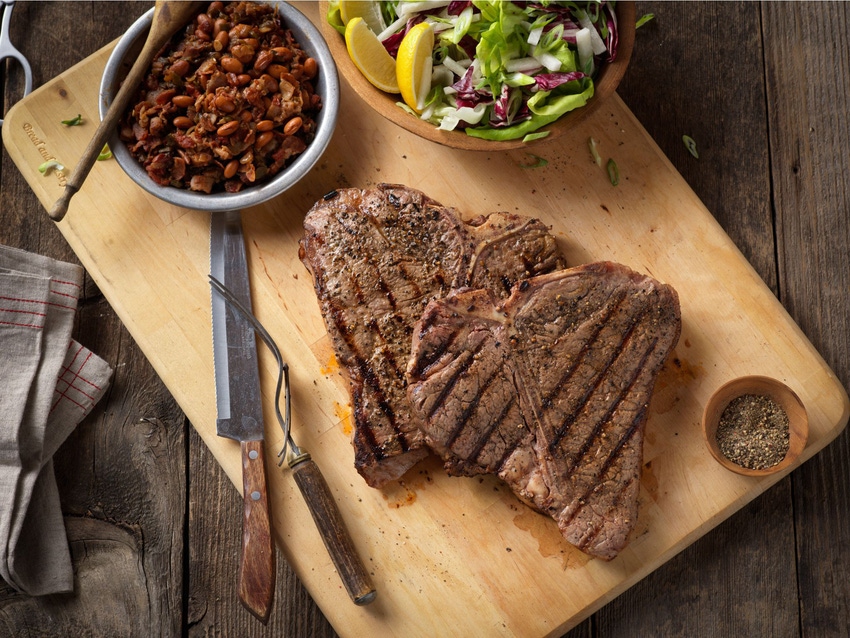Eating meat is a tradition as old as history itself and veganism has yet to prove itself as a long-term healthful way of eating. Here are some recent headlines that highlight this sentiment.
September 11, 2018

Since the 1970s, we have been told that meat, eggs and dairy are bad for us and that we should eat larger quantities of grains, fruits and vegetables in order to live longer, healthier lives.
This may be considered one of the worst human experiences in history as the calories-in, calories-out model that pushes carbohydrates instead of saturated fats has led to a dramatic rise in cancer, heart disease, diabetes and more. This theory can be further explored by popular nutrition authors Nina Teicholz and Gary Taubes.
READ: Teicholz says dietary recommendations are "shockingly" unscientific
READ: Good news for beef; Taubes explains why we get fat
However, the tide seems to be shifting in a new direction in recent years with more people looking at the consumption of animal fats and proteins as the solution to their health woes.
Just check out these recent headlines about beef as a health food, to give you an idea of how some consumers are changing their minds about beef.
“Eating cheese and red meat is actually good for you” by David K. Li for the New York Post
Li writes, “Grill up that steak and roll out a wheel of cheddar — because red meat and cheese are back on the menu for healthy living. Researchers at McMaster University in Hamilton, Ontario, found that people who scarf down higher levels of red meat and cheese are likely to live longer.”
“Could meat and cheese be good for your heart?” featured on ABC 13 News
Referencing the same study, here’s an excerpt: “The early death rates of people who ate 3 portions of dairy and 1.5 portions of meat a day were 25% lower than those who consumed less, the researchers found. They also had 22% fewer heart attacks. Scientists say the findings contradict decades of advice to cut down on full-fat dairy and red meat.”
Yet despite this good news about beef, the naysayers will continue to bang their drums and scream loudly into their microphones to convince people otherwise. Meat is bad, they chant, and if you want to live on the ethical, health, ideological, environmental high ground, you better abstain, they say!
READ: How beef benefits heart health, muscle mass & brain function
Take, for example, the rise of McDonald’s McVegan burger, which was introduced in 2017 in in Sweden, where one in ten adults and one in five under age 30 are vegetarians.
According to an article titled, “What’s driving the rise of the McVegan burger,” which was published by the BBC, “The vegetarian wave in Sweden, Morseravi says, has likely come from a collective desire for more plant-based food. The only difficulty is finding the proper balance – and making the food appealing on a national scale. In the case of the McVegan, he says, McDonald’s has hit the nail on the head.”
The troubling thing is this meatless rhetoric totally ignores centuries of humanity and how populations around the world have traditionally eaten.
Georgia Ede, MD, explains it well on her blog, Diagnosis Diet. She writes, “To the best of my knowledge, the world has yet to produce a civilization which has eaten a vegan diet from childhood through death, whereas there are numerous examples throughout recorded history of people from a variety of cultural, ethnic and geographical backgrounds who have lived on mainly-meat diets for decades, lifetimes, generations. What exactly did these carnivorous cultures eat, and how healthy or unhealthy were they?
“To my mind, examples of real people eating mostly-meat diets for long periods of time gives us much more powerful information about meat and health than conventional scientific studies conducted over short periods of time in which one group of people eats a little more meat or a few extra servings of vegetables than another group of people.”
Ede lists the populations who traditionally follow very meat-rich diets. They include the Chukotka of the Rus-sian Arctic, the Masai, Samburu and Rendille warriors in East Africa, the steppe nomads of Mongolia, the Sioux of South Dakota and the Brazilian gauchos.
Read more about these populations by clicking here.
I know I say this a lot, but the cattle industry has a powerful story to share — a story that highlights the nutritional benefits of beef, how cattle grazing benefits the environment and how ranchers truly care about the welfare of their livestock. Our values are the same ones shared by our consumers, but it’s up to us to keep the conversation rolling and endear the men and women in this business with every day people who are simply looking for foods to purchase that make them feel good mentally and physically.
Beef can be that food, but we’ve got a big job in talking over the screaming microphones. Let’s get to work!
The opinions of Amanda Radke are not necessarily those of beefmagazine.com or Farm Progress.
About the Author(s)
You May Also Like





